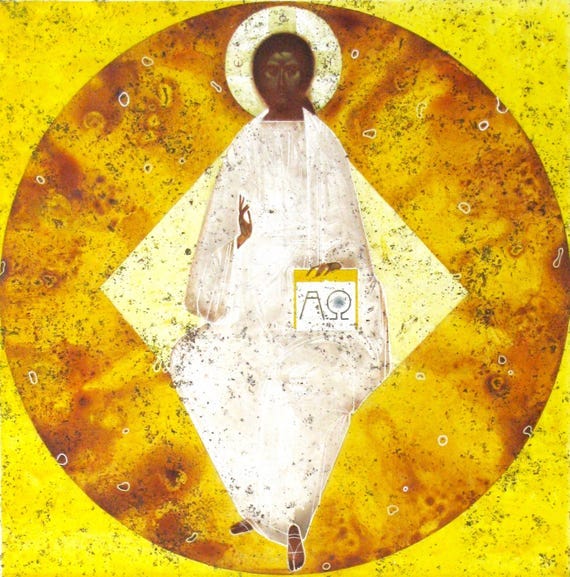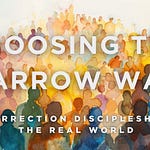Jesus does not cater to our preferences or ease us into discipleship with comforting words. Instead, He turns to the crowds and states plainly:
“Whoever comes to me and does not hate father and mother, wife and children, brothers and sisters—yes, even their own life—cannot be my disciple.”[i]
Jesus isn’t advocating hatred but exposing our illusions. We assume our closest relationships define our reality, but Bonhoeffer reminds us:
“The call of Jesus teaches us that our relation to the world has been built on an illusion… Between father and son, husband and wife, the individual and the nation, stands Christ the Mediator.”
Jesus never softens the cost of discipleship, and neither should we. We like faith to be manageable, comfortable, even private—but Jesus refuses to be a part-time Savior.
Consider the rich young ruler in Mark 10. He kept the commandments, did everything right. Yet Jesus, loving him, told him the truth: “Go, sell everything you have and give to the poor… Then come, follow me.” The man walked away grieving. Jesus didn’t lower the bar—He let him go.
Or John 6, where Jesus says His followers must eat His flesh and drink His blood. Many abandon Him. He doesn’t soften His words but asks the Twelve: “You do not want to leave too, do you?” Peter replies, “Lord, to whom shall we go? You have the words of eternal life.”
Jesus demands everything because He offers everything. His words are hard because the truth is hard. Yet, for those who stay, there is life beyond what we can imagine.
Discipleship forces us to wrestle with our ultimate allegiance. Is it to our families? Careers? Ambitions? Or is it Christ? This isn’t about neglecting responsibilities but recognizing that all must be ordered under Him. True love for family, fulfillment in work, and purpose in life can only be found when we first submit to Christ.
Last week, we saw how we soften Scripture to make it more palatable, shrinking words like ‘rebuke’ to avoid challenge. But Jesus doesn’t offer a private, part-time faith. He calls us to take up our cross, die to ourselves, and live fully as His body—not in isolated suffering, but in shared rejection and solidarity with those the world casts aside.
We Like to Keep Faith Private
Our culture highly values individualism, emphasizing personal choice and self-determination. This ethos extends into our approach to spirituality, where faith is often viewed as a personal matter—something between “me and God.”
This individualistic perspective has contributed to a growing trend of people identifying as “spiritual but not religious.” A 2012 study by the Pew Research Center shook many who track such trends. Among the religiously unaffiliated, 37% described themselves as spiritual but not religious, while about 42% said they were neither spiritual nor religious.[ii]
More recent data indicates that this trend has continued. A 2025 Pew Research Center survey found that “upward of half of U.S. adults (53%) say they are both spiritual and religious, while 21% say they are spiritual but not religious. Just 5% say they are religious but not spiritual, and 21% say they are neither spiritual nor religious.”[iii]
These statistics reflect a broader societal shift away from organized religion toward individualized spirituality. Faith, in this mindset, becomes a personal therapeutic tool rather than a communal call to transformation.[iv]
However, Jesus doesn't call individuals into isolation; He calls them into a body, into a mission, into the church. When He says, “Whoever does not carry the cross and follow me cannot be my disciple,”[v] He isn't offering a personalized, comfortable path. He's presenting the only way—a way that is inherently communal and often challenging.
Faith is not a self-help journey; it is a communal transformation. Discipleship means being shaped by a community that will challenge us, encourage us, and hold us accountable. The Christian life is not meant to be lived in solitary devotion but in shared commitment. To be a disciple is to be a part of something larger than ourselves—a body of believers united in Christ.
The Illusion of a Direct Relationship
We tell ourselves:
“I can be a good Christian without being part of a church.”
“I can follow Jesus and keep my personal life separate.”
“I can be a disciple without sacrificing my comfort.”
But Christ does not offer faith on our terms. He is the mediator. Every relationship, every allegiance, every personal ambition must go through Him. This isn’t up for negotiation. It’s already been established—fait accompli. The only question is whether we will live in response to it.
Bonhoeffer again:
“This breach with all our immediate relationships is inescapable... We shall have to leave the immediacy of the world and become individuals, whether secretly or openly.”
Faith in Christ is not a private possession. It’s a public, communal reality. When we attempt to go it alone, we lose the very means by which Christ shapes us. We lose the relationships that hold us accountable. We lose the voices that challenge our assumptions. We lose the shared mission that gives our faith purpose beyond ourselves.
Compartmentalizing Faith: The Danger of a Private Spirituality
We like to keep faith in its own compartment. Church on Sundays, the rest of life untouched.
John Wesley warned:
“Christianity is essentially a social religion, and to turn it into a solitary one is to destroy it.”[vi]
Compartmentalized faith is faith that is easily abandoned. Jesus doesn’t call us to a weekend spirituality—He calls us to take up our cross and live fully as members of His body—not in isolated suffering but in shared rejection, in solidarity with those the world casts aside.
Think about how we introduce people: “Oh, I know them from church.” We might introduce a co-worker the same way, as if church is just one category of life rather than the defining reality of our existence. What would it mean if our faith were not just something we practiced but something that defined every aspect of our lives? How would our priorities shift? How would our relationships be transformed?
Counting the Cost—For the Sake of the Church
Jesus warns: Don’t follow Him without considering the cost.
The cost isn’t just personal sacrifice—it’s giving up the illusion of self-made faith. Discipleship is a life shaped within the church, by the church, for the world.
Bonhoeffer again:
“It is not for us to choose which way we shall follow. That depends on the will of Christ.”
The irony? Only in surrendering our individualistic grip do we truly become ourselves—as part of the body of Christ. The church is not an add-on to faith; it is the vessel through which we are shaped into Christ’s likeness.
A Church That Forms Disciples
We don’t just make disciples; we are made into disciples together.
The mission of The United Methodist Church is to, “Make disciples of Jesus Christ for the transformation of the world.”[vii] On the surface, this sounds like a task we are responsible for accomplishing—something we can check off as individuals. But discipleship isn’t a checklist or a solitary achievement—it’s a communal process. We are not lone workers in the field, but a body being formed and reformed by Christ through worship, service, learning, and accountability.
Jesus, in His wisdom, knew that we cannot live the Christian life in isolation. It is through the community of faith, through the gathered body of believers, that we are nourished and shaped. We are not disciples because of our individual accomplishments but because of the grace of God working through the church. The church is where we are molded into the image of Christ—not through our own efforts or achievements, but through the power of God's transformative grace.
When one part of the body grows, all parts grow. This is the beautiful mystery of the body of Christ. The growth of one member of the body is not just a personal victory; it is a victory for the whole body. As each member is transformed, the entire church is impacted, growing in unity, grace, and mission. Our discipleship is intertwined with the discipleship of others. We are formed together.
The church’s mission isn’t to create religious consumers. It’s not about attracting people who treat the church like a spiritual supermarket where they take what they need and leave. No, the church’s mission is to form a people who embody the gospel. We are called to become a people who live out the love, grace, and mercy of Christ in the world. This is what discipleship looks like—a people marked not by self-interest but by radical selflessness, serving others and living fully for Christ.
Because Christ stands as our mediator, we do not simply go about our lives and add faith when convenient. Discipleship isn’t something we squeeze into our busy schedules. Instead, our entire way of being is transformed by Christ. The call to follow Jesus is not a side project or an afterthought; it is the very foundation of who we are. When we truly respond to Christ’s call, we don’t just serve the church as a duty—we are the church, living as a response to the grace we’ve received.
And when the world sees a church that has counted the cost—when it sees disciples who don’t compartmentalize Jesus but live fully in Him—the world sees Christ. Our witness, mission, and life together testify to the reality of the gospel. We are not just individuals trying to make it on our own; we are a body of believers, bound together in Christ, living out His love and mission in the world.
The Call to Follow
Jesus doesn’t invite us into a hobby where we can take a break from the world—He calls us into a way of life.
The choice isn’t between private faith and a community. Th’s between self-made faith and true discipleship.
The invitation stands: step out of your illusion of control, out of isolated spirituality, and into the body of Christ.
Christ has already chosen us.
[i] Luke 14:26
[ii] https://www.pewresearch.org/religion/2012/10/09/nones-on-the-rise-religion
[iii] https://www.pewresearch.org/religion/2025/02/26/spiritual-and-religious-self-descriptions/
[iv] https://www.axios.com/local/phoenix/2025/04/03/religious-affiliation-christianity-arizona
[v] Luke 14:27
[vi] https://www.resourceumc.org/en/content/sermon-24-upon-our-lords-sermon-on-the-mount-4
[vii] https://www.umc.org/en/content/book-of-discipline-120-ff-section-1-the-churches
















Share this post